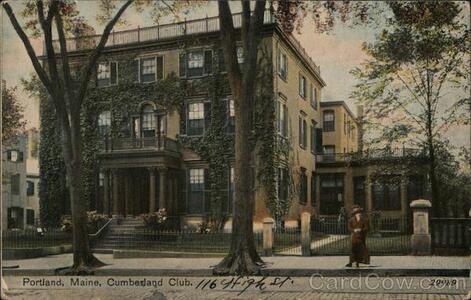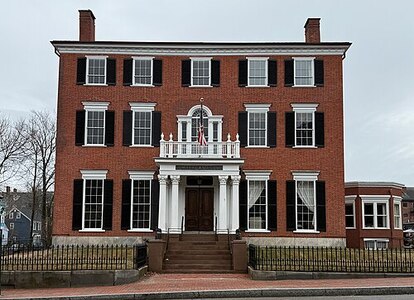The Cumberland Club
BackThe Cumberland Club
116 High Street
This trail starts on High Street directly across from the Portland Museum of Art, in the heart of the Arts District. A little down High St. and on the right stands a stately historic brick Federal Style building known as the Cumberland Club.
The Cumberland Club, formed in 1877, was organized as a voluntary association “for the purpose of mutual enjoyment of cultural and social amenities,” and possibly to avoid Maine’s Prohibition law. In 1895, club members bought this mansion—originally built in 1801 as a private residence for merchant Stephen McLellan— and moved the club’s headquarters here to 116 High Street, where it has remained ever since.
As the oldest social club in the state, the Cumberland Club was an important political center of both Portland and Maine politics. Today, it has a non-discrimination policy in place, but from the 1920s until 1969, most clubs and hotels in Maine, including this one, did not admit Jewish or Black Americans. A 1955 report by the Anti-Defamation League of B’nai Brith (the precursor to the ADL) stated that, “Aside from Florida, no state surpasses Maine in its blatant bias toward vacationers because of religion.”
Changing the Cumberland Club’s discriminatory policies took years, and a cycle of persistence, advocacy, education, boycotts and strong legal arguments. First, during the 1950s and 1960s, prominent Jewish leaders called for boycotts, with little effect. Sumner Bernstein and his wife Rosalyne circulated a “Cumberland Club Letter” that demanded any organization to which they or Bernstein’s father, Israel, belonged, hold no meetings at the Cumberland Club as long as it refused to admit Jews. The same demand was made by Barney Shur, when he assumed the presidency of the United Fund Campaign, and Lenny Nelson, when he became president of the board of the Portland Symphony Orchestra. Those organizations retained those policies after Bernstein, Shur and Nelson left, but not all boycott actions outlasted their Jewish advocates. Merle Nelson, on joining the exclusive Junior League as its first Jewish member, insisted that the League not meet at the Cumberland Club; the League returned there after Merle left.
The second step to end discrimination was to try to change state law. Each year for six years, Dr. Benjamin Zolov and Justice Sidney Wernick presented a bill to the Maine legislature arguing that discrimination was inconsistent with the Constitution. Finally, in 1959, a public Accommodation Law passed, making it illegal—at least on paper—for Maine hotels and resorts to discriminate on the basis of race, color or creed. However, in practice, private Portland clubs (and many others in Maine) continued to exclude Jews and African-Americans.
Facing persistent discrimination that ignored state law, a more creative legal strategy was needed. In 1969, several Jewish Portlanders, including attorney Herb Barnett and Kermit Lipez, then a young legal advisor to Governor Kenneth Curtis, pointed out to the Governor that many Maine resorts and clubs that continued to practice social and religious exclusion earned much of their revenue from the sale of liquor. Since liquor licenses were issued by the state, they proposed a bill in the Maine Legislature to deny a liquor license to any organization that practiced discrimination. Curtis reached out to state senator Peter Mills (the father of current Governor Janet Mills), who sponsored L.D. 1349, a bill denying a state liquor license to any establishment that “covertly and under cover quietly practice any type of discrimination against people because of their religion, their race or their ethnic origin.” The legislation passed and the prohibitions were, in principle, eliminated.
In practice, however, the statute required that each locality (in this case, the City of Portland) had to approve a liquor license before it was sent to the state to be issued, and again, Portland continued to drag its feet. This required a fourth strategy. Portland Jewish leaders like Rabbi Sky, Dr. Zolov, Sumner Bernstein and Alan Levenson, working together with Charles Allen (a non-Jewish lawyer and city council member), petitioned the city council to deny liquor licenses to clubs that continued to discriminate on the basis of race or religion. This took nearly four weeks for the city council to approve, and even then, Governor Curtis received angry phone calls from the Cumberland Club and the Portland Club. In reality, it took the prominent social clubs nearly another year to admit select Jews, with one exception: The Cumberland Club made it clear that it would forever deny membership to Sumner Bernstein because of the “Cumberland Letter” he had penned more than a decade before.
But the fight to end discrimination still wasn’t over. Gerald Talbot, an African-American Portlander, served three terms on the Maine House of Representatives from 1972 to 1978. When he first ran for office in 1972, he was allowed as a candidate to enter the Cumberland Club and the Elks Club, but noted that despite the 1969 rule, Blacks were still not allowed membership.
Though they didn’t create precedents, a small number of early case-by-case wins are still worth recording. The first was owed to the bullheadedness of Dr. Benjamin Zolov. In 1954, the Maine Medical Association (at the time about 1000 members strong) planned to hold their annual convention at the Colony Hotel in Kennebunkport, which refused to serve or accommodate Jews. In response, Zolov wrote to the head of the Maine Medical Association, saying that if they didn’t change their venue, he would write to all the doctors in the state to tell them of the hotel’s policy of exclusion. After receiving support from the 26 doctors in Portland, the head of the medical association told Zolov that he could move the meeting, as long as he took over all the logistics. Zolov moved the convention to the Eastland Hotel, and the Maine Medical Association never returned to the Colony.
The second win was at the Rotary Club. Membership in the Rotary was effectively denied to Jews, including several very prominent Portland lawyers such as Israel Bernstein. Upon discovering that the Rotary membership categories included one for “Rabbi,” (which was, of course, an unfilled position), Rabbi Bennett from Temple Beth El (Stop W02) applied and was admitted. A similar result was achieved at the Masons.
The handful of successes in the fight against discrimination remained outliers. As Dr. Zolov reflected later, “I can remember when the Maine Medical Association was going to have that meeting … I closed up my office one afternoon and my wife came in and we sat down to write all these different letters. And I was so determined at that time. And, of course, it came to fruition. Things do not always work out as well as you would like … but you try.”

